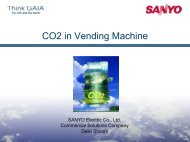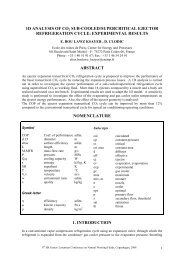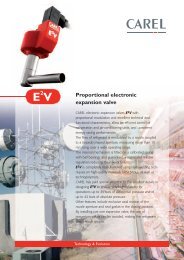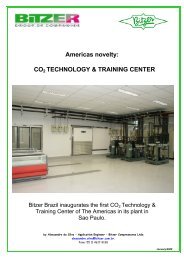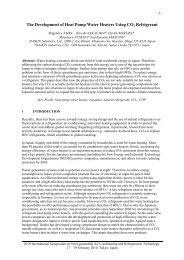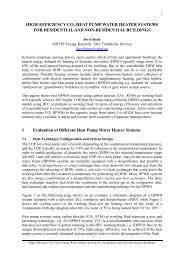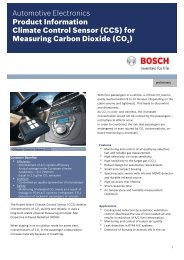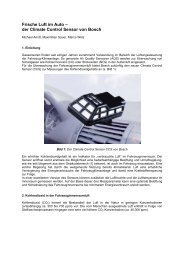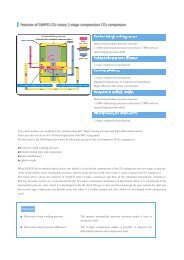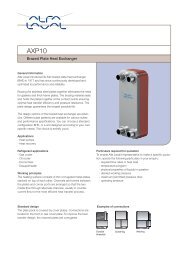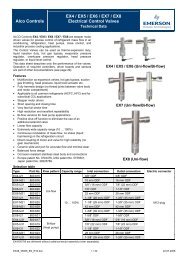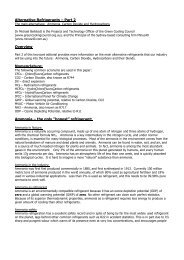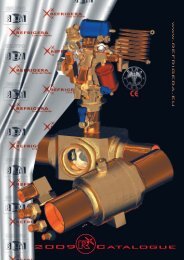TABLE OF CONTENTS
TABLE OF CONTENTS
TABLE OF CONTENTS
You also want an ePaper? Increase the reach of your titles
YUMPU automatically turns print PDFs into web optimized ePapers that Google loves.
End user views on natural refrigerants<br />
IF YOU HAD TO FORMULATE A GLOBAL ACTION PLAN TO BRING NATURAL REFRIGERANTS FASTER TO MARKET WHAT WOULD BE YOUR TOP<br />
3 PRIORITIES?<br />
“ In terms of rollout in developing and emerging economies<br />
we need to see investment in training to support the units<br />
once they are in service. We know that when you are going<br />
into a new market with a new technology that has to go<br />
lock-step with the investment in training, and people running<br />
training companies need to think about whether they<br />
are geared up to service these units. On the policy side, it<br />
would be whether there is any scope for the things like the<br />
Montreal Protocol to be extended to include natural refrigerants<br />
so that we can use the funding that is available<br />
through those channels to support the transition, not just<br />
from HCFC to HFC but from HCFC to leapfrog into natural<br />
refrigerants. It’s a big ask, it involves an international multilateral<br />
process, but we could see a real step change if we<br />
could get some kind of agreement like that.”<br />
Thomas Lingard, Unilever<br />
“In addressing cooling technologies, governments must initiate<br />
a strong first step of setting a phase-out date for HFCs<br />
and mandate natural refrigerants as the only acceptable<br />
form of cooling gases. Simultaneously, they must tax the<br />
use of HFCs as an incentive for the development and commercialization<br />
of HFC-free technologies. Finally, to ensure<br />
success, the industry needs an accompanying knowledge<br />
and training network to address operational concerns.”<br />
Antoine Azar, The Coca-Cola Company<br />
“McDonald’s Germany opened the first HFC-free restaurant<br />
in Heidelberg in October 2011. Resulting from our experience<br />
with the HFC-free restaurant, availability is amongst<br />
our top priorities when it comes to making natural refrigerants<br />
widely accessible to the market. Suitable equipment<br />
that is ready and available is indispensable. A second priority<br />
is cost-effectiveness. The equipment operating on natural<br />
refrigerants needs to be profitable in operation. Otherwise,<br />
companies will not invest in it. Moreover, solutions for<br />
cooling and air conditioning have to be operable in order<br />
to set valuable incentives for changing to natural refrigerants.<br />
Thus, operability is a third priority for bringing natural<br />
refrigerants to the market.<br />
Achieving these three priorities requires more commitment<br />
from companies and politicians alike. Our suppliers have<br />
already recognized these requirements. After the testing<br />
phase, they will continue to develop the instrumentation to<br />
make it marketable. However, in order to produce HFC-free<br />
equipment that is readily available, cost-effective as well<br />
as operationable, more stakeholder engagement is necessary.”<br />
McDonald’s<br />
“1. HEINEKEN would focus on stimulating EcoDesign for<br />
further reductions in energy consumption and improvement<br />
of natural refrigerant applications<br />
2. HEINEKEN would focus on ensuring that appliances<br />
comply with applicable legislation and the development<br />
of industry standards for cooling and refrigeration<br />
3. HEINEKEN would focus on increasing availability of<br />
natural refrigerants and thereby achieving economies<br />
of scale<br />
HEINEKEN has chosen to invest in natural refrigerants because<br />
of the better environmental performance, in terms of<br />
energy use and carbon footprint impact, and because of<br />
the value it offers to our customers. “<br />
HEINEKEN<br />
“You have to look first at labelling and certification in a<br />
refrigeration training program. Technical issues can be<br />
discussed forever, but they can be resolved. I would imbed<br />
certification for refrigerant training and labelling in a comprehensive<br />
system and have this certification system not<br />
only cover natural refrigerants but all refrigerants. This will<br />
also create confidence at the customer or end-user level.<br />
Regarding equipment costs one could steer the selection of<br />
natural refrigerants in a first instance through the lowering<br />
of taxes, while also introducing higher taxes on high GWP<br />
refrigerants.”<br />
36<br />
Dr. Lambert Kuijpers, University Eindhoven



